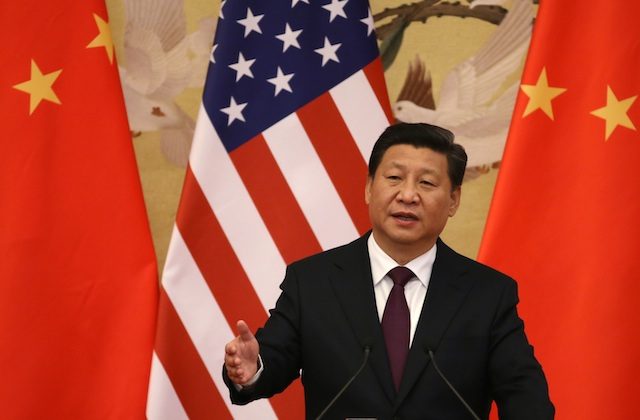SUMMARY
This is AI generated summarization, which may have errors. For context, always refer to the full article.

UNITED NATIONS – Chinese President Xi Jinping pressed Sunday, September 27, for the world to step up efforts to improve women’s rights, but his push was clouded by his own country’s detention of feminists.
Paying his first visit to the United Nations, Xi invited fellow world leaders to a special session to mark 20 years since a landmark UN conference on women in Beijing.
Xi announced a $10 million pledge to the UN agency for women and said China would in the next 5 years build 100 health centers and an equal number of school start-ups for girls in the developing world.
“China will do more to enhance gender equality as its basic state policy,” Xi said, citing a Chinese proverb that women “hold up half the sky.”
“In many parts of the world… inequality still exists between men and women in rights, opportunities and access to resources,” he said.
The 1995 conference declared that “women’s rights are human rights” and called for women’s full incorporation in schools and government.
But China earlier this 2015 detained for one month 5 young feminists on the eve of International Women’s Day.
China, which clamps down on any sign of domestic dissent, rounded up the women as they prepared to hand out leaflets about sexual harassment on public transport.
Clinton knocks Xi
US President Barack Obama, who was flying Sunday to the United Nations, shunned Xi’s meeting.
Hillary Clinton, who is campaigning to succeed Obama and become the first female US president, condemned Xi and voiced support for the #FreeThe20 campaign that aims to release 20 women activists around the world.
“Xi hosting a meeting on women’s rights at the UN while persecuting feminists? Shameless,” Clinton wrote on Twitter.
As US first lady, Clinton gave a speech at the 1995 Beijing conference that was considered influential in bringing a woman’s role in society to the level of a fundamental universal right.
But as Obama’s secretary of state, Clinton also sought a smooth relationship with China and faced criticism from some human rights activists.
Xi has been seeking to highlight China’s growing global role.
He pledged $2 billion in development aid on Saturday, September 26, and a day earlier announced greater action on climate change as Obama welcomed him at the White House.
Merkel denounces conflict abuses
A wide range of national leaders nonetheless spoke at Xi’s event including women such as German Chancellor Angela Merkel, Brazilian President Dilma Rousseff, Bangladeshi Prime Minister Sheikh Hasina and Liberian President Ellen Johnson Sirleaf.
Merkel, who has championed a welcoming approach to refugees, said it was particularly critical to protect women facing rape, slavery and other abuses in Syria, Iraq, Nigeria and other troubled countries.
“Women’s rights are human rights, too. Isn’t it disgraceful to humanity that we need to underline this?” Merkel said.
“But it is true – women urgently need more protection, particularly in war zones and crisis regions,” she said.
Civil society under threat in China
In an open letter to UN Secretary-General Ban Ki-moon, who joined Xi, the 5 formerly detained feminists said that at home China was increasingly stifling civil society.
“This is an unexpected and shameful setback, as well as a historical mistake” 20 years after the Beijing conference, they wrote.
China’s record on women’s rights is hardly the worst in the world, with the communist leadership considering gender equality a key principle.
Some 23% of national legislators in China are women, compared with 19% in the US Congress, according to the World Bank. (The highest is 64% in Rwanda, where women form a majority in the wake of the 1994 genocide.)
The United States, meanwhile, is one of the main holdouts from ratifying the UN treaty on women’s rights, in part due to conservative lawmakers’ objections to its enshrinement of women’s reproductive rights. – Shaun Tandon, AFP/Rappler.com
Add a comment
How does this make you feel?
There are no comments yet. Add your comment to start the conversation.